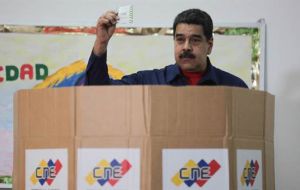MercoPress. South Atlantic News Agency
Opposition parties will be barred from 2018 presidential vote, Maduro anticipates
 Key figures who have led street protests against Maduro's rule such as Henrique Capriles, Leopoldo Lopez and others, will be barred from the presidential election
Key figures who have led street protests against Maduro's rule such as Henrique Capriles, Leopoldo Lopez and others, will be barred from the presidential election  ”If they don't want elections, what are they doing? What's the alternative? (Civil) war?” the president asked, visibly angry.
”If they don't want elections, what are they doing? What's the alternative? (Civil) war?” the president asked, visibly angry.  While municipal elections were under way across the country, the Maduro clearly had his mind on the 2018 presidential race in which he plans to seek reelection
While municipal elections were under way across the country, the Maduro clearly had his mind on the 2018 presidential race in which he plans to seek reelection President Nicolas Maduro announced Sunday that leading opposition parties will be barred from taking part in next year's presidential vote after they boycotted mayoral polls, in a move set to further consolidate his grip on power. That includes the groups of key figures who have led street protests against his rule such as Henrique Capriles, Leopoldo Lopez and others, Maduro told reporters after casting his vote in the municipal polls.
“That's what the National Constituent Assembly set out,” he said, referring to a controversial Maduro-allied special powers legislature whose legitimacy has been questioned by many in the international community.
”If they don't want elections, what are they doing? What's the alternative? (Civil) war?” the president asked, visibly angry.
While municipal elections were under way across the country, the Maduro clearly had his mind on the 2018 presidential race in which he plans to seek reelection -- despite an approval rating of around 30%.
Crisis-weary voters meanwhile appeared to be staying away in droves from mayoral elections that the opposition is already boycotting. A few hours after polling stations were supposed to open, 98% of the 14,000 facilities were up and running, according to the National Election Board (CNE).
Yet turnout in many places appeared to be light, and in others extremely so.
In terms of politics, the local election stakes might seem low. Yet a failure in municipal votes could be seen by many a sign the government had lost the support of the massive lower-income base it relies on to stay in power and in charge of the state led economy.
Luis Emilio Rondon, a member of the electoral board, said that there were some irregularities involving pro-government candidates who are running some polling stations. He did not immediately say where, or address the extent of the issue.
But voting “cannot be restricted, obligatory, or supervised by people with political interests” therein, Rondon told reporters.
He also said he had had reports that in some polling stations run by the ruling PSUV, officials were making sure that those who have a special social benefits card get out to cast their votes. He said some of these voters' “Fatherland Card,” an electronic card that helps them get scarce food and medicine, was being scanned.




Top Comments
Disclaimer & comment rules-

-

-

Read all commentsWow. Maduro is planning Soviet-style show elections and he's still 6 times as popular as Temer.
Dec 11th, 2017 - 09:40 pm +1Also, what's wrong with cardboard polling booths? Seems they would do the job of providing privacy perfectly adequately. There's a lot of really serious problems in this election to complain about.
I thought he meant the thing Maduro is standing behind in the picture. It looks like an unfolded cardboard box. I don't see a problem with using cardboard for privacy, it's opaque which is the important thing, and that's the least of their problems anyway.
Dec 12th, 2017 - 10:53 pm +1How do you vote in Brazil? Paper ballots? Do you have to show ID?
@JB
Dec 15th, 2017 - 07:07 pm +1I never understood why countries would adopt those electronic machines when they seem to make fraud so easy. I've seen lots of Americans complaining about them too.
We still vote the old fashioned way by putting a cross on a piece of paper, and to vote you must be registered and give your name and address at the polling station, but no ID is required. We don't have a national ID card anyway.
Even so, it's thought most of the electoral fraud in the UK is due to postal voting.
Commenting for this story is now closed.
If you have a Facebook account, become a fan and comment on our Facebook Page!